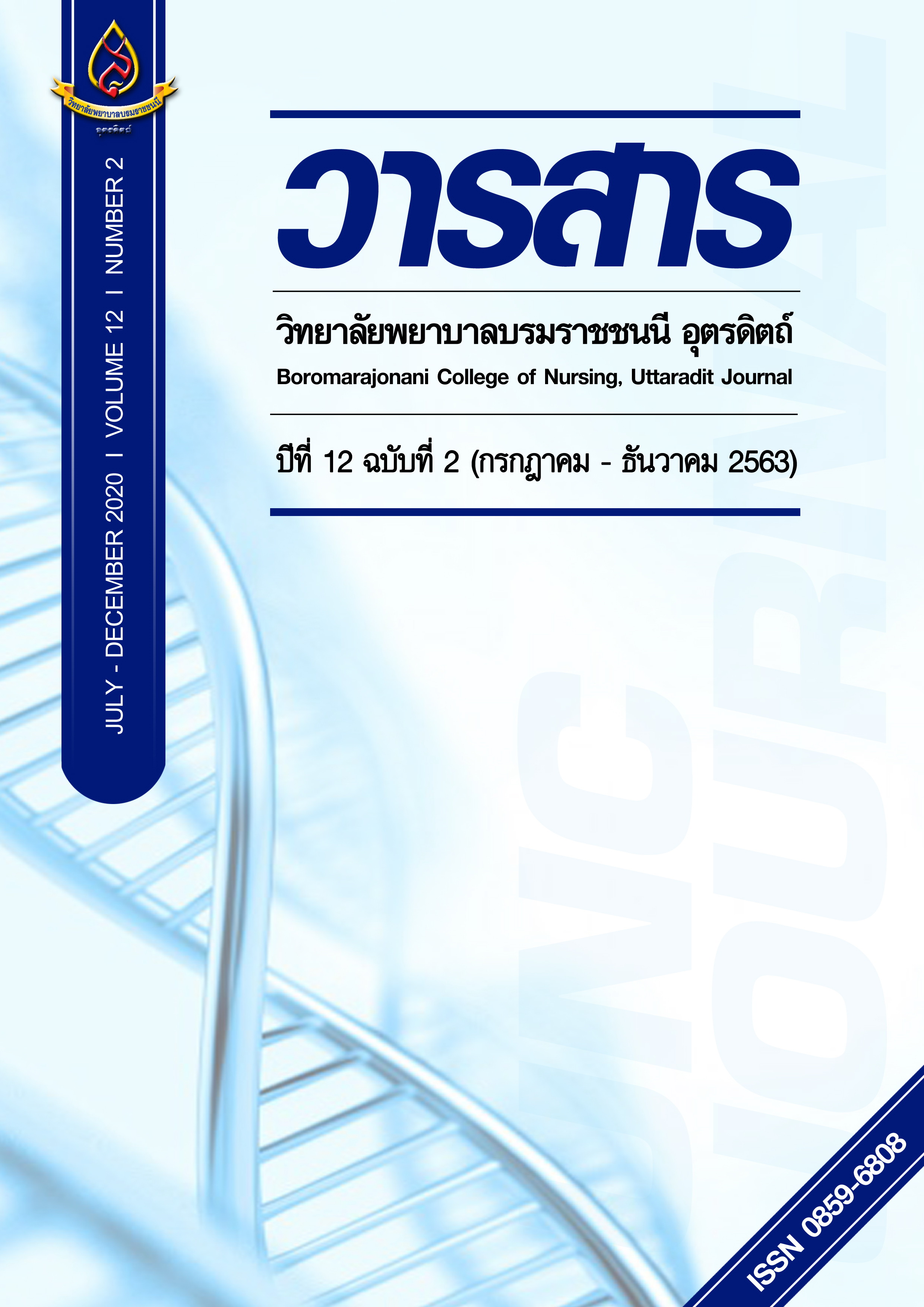อิทธิพลของการเสริมสร้างพลังอำนาจและสัมพันธภาพระหว่างแพทย์กับพยาบาลต่อคุณภาพการดูแลของพยาบาลวิชาชีพ แผนกผู้ป่วยในโรงพยาบาลอุตรดิตถ์
Main Article Content
บทคัดย่อ
การศึกษาครั้งนี้ มีวัตถุประสงค์เพื่อศึกษา 1) การเสริมสร้างพลังอำนาจ สัมพันธภาพระหว่างแพทย์กับพยาบาลและคุณภาพการดูแลของพยาบาลวิชาชีพ และ 2) อิทธิพลของการเสริมสร้างพลังอำนาจและสัมพันธภาพระหว่างแพทย์กับพยาบาลที่มีต่อคุณภาพการดูแลของพยาบาลวิชาชีพแผนกผู้ป่วยใน โรงพยาบาลอุตรดิตถ์ เครื่องมือที่ใช้ในการศึกษาประกอบด้วย แบบสอบถามการเสริมสร้างพลังอำนาจ สัมพันธภาพระหว่างแพทย์กับพยาบาล และคุณภาพการดูแลของพยาบาลวิชาชีพที่ได้รับการสุ่มอย่างง่าย จำนวน 118 คน การตรวจสอบความตรงตามเนื้อหาจากผู้ทรงคุณวุฒิจำนวน 5 ท่าน ได้ค่าดัชนีความตรงตามเนื้อหาเท่ากับ .90, .90 และ 1 ตามลำดับ และค่าสัมประสิทธิ์อัลฟาของครอนบาคเท่ากับ .89, .76 และ .96 ตามลำดับ วิเคราะห์ข้อมูลโดยใช้การแจกแจงความถี่ ร้อยละ ค่าเฉลี่ย ค่าเบี่ยงเบนมาตรฐาน สถิติสัมประสิทธิ์สหสัมพันธ์ของเพียร์สัน และการวิเคราะห์ถดถอยพหุคูณแบบเพิ่มตัวแปรเป็นขั้นตอน
ผลการศึกษา พบว่า พยาบาลวิชาชีพมีการเสริมสร้างพลังอำนาจ สัมพันธภาพระหว่างแพทย์กับพยาบาลและคุณภาพการดูแลโดยรวมอยู่ในระดับสูงและมีอิทธิพลต่อคุณภาพการดูแลของพยาบาลวิชาชีพ โดยทั้งสองตัวแปรสามารถร่วมอธิบายความแปรปรวนของคุณภาพการดูแลของพยาบาลวิชาชีพได้ ร้อยละ 45.3 อย่างมีระดับนัยสำคัญที่ p < .001 ข้อเสนอแนะควรมีการเสริมสร้างพลังอำนาจให้กับพยาบาลวิชาชีพอย่างต่อเนื่องและส่งเสริมสัมพันธภาพระหว่างแพทย์กับพยาบาลเพื่อเพิ่มคุณภาพการดูแลแก่ผู้รับบริการให้ดียิ่งขึ้น
Article Details
บทความหรือข้อคิดเห็นใดใดที่ปรากฏในวารสารวิจัยการพยาบาลและวิทยาศาสตร์สุขภาพ เป็นวรรณกรรมของผู้เขียน ซึ่งบรรณาธิการหรือสมาคมศิษย์เก่า ไม่จำเป็นต้องเห็นด้วย และบทความที่ได้รับการตีพิมพ์เผยแพร่ถือเป็นลิขสิทธิ์ของวารสารวิจัยการพยาบาลและวิทยาศาสตร์สุขภาพ
เอกสารอ้างอิง
2) Auamtani, A. (2014). Empowerment of nursing services. In Editor (Ed.), Development Services of Nusrsing (Chapter 14, 1-53). Nonthaburi Sukhothai: Thammathirat University. (in Thai).
3) Bogaert, P.V., Peremans, L., Wit, M., Vanheusden, D., Franck, E., Timmermans, O., & Haven, D.S. (2015). Nurse managers perceptions and Experiences regarding staff nurse empowerment: a quality study. Frontiers in Psychology, 6(1), 1-10.
4) Breau, M., & Rhéaume, A. (2014). The relationship between empowerment and work environment on job satisfaction, intent to leave and quality of care among ICU nurses. Canadian Association of Critical Care Nurses, 25(3), 16-24.
5) Chimi, K., Akkadechanunt, T., & Chontawan, R. (2015). Factors Relation to Quality of Nursing Care in Teriary Care Hospitals The Kingdom of Bhutan. Nursing Journal, 42, 126 - 135.
6) Doungpamorn, T. (2009). Relationship between Empowerment working of Team and Outcome of Nursing, Hospital center 14th Ministry of Public Health. (master’s thesis). Sukhothai Thammathirat Univerity, Nonthaburi. (in Thai).
7) Faul, F., Erdfelder, E., Lang, A.-G., & Buchner, A. (2007). G*Power 3: A flexible statistical power analysis program for the social, behavioral, and biomedical sciences. Behavior Research Methods, 39, 175-191.
8) Hingkanont, P. (2016). Nursing service quality development. In Editor (Ed.), Development Services of Nursing (Chapter 9, 1-42). Nonthaburi Sukhothai: Thammathirat University. (in Thai)
9) Jalali, Z. & Shaemi, A. (2015). The impact of nurses’ empowerment and decision-making on the care quality of patients in healthcare reform plan. International academic Journal of Organizational Behavior and Human Resource management, 2(9), 33-39.
10) Junhorm, J. (2007). The relationship between personal factors empowerment for practice of service quality development activities staff nurses in Community Hospital. (master’s thesis). Sukhothai Thammathirat University, Nonthaburi. (in Thai).
11) Johnson, S., & Kring, D. (2012). Nurse, perceptions of nurse – physician relationships: medical – surgical VS. intensive care. Academy of Medical-Surgical Nurses, 21(6), 343-347.
12) Kanrat, K., Pongthavornkamol, K., & Wattanakitkrileart, D. (2016).Factors associated with perception of quality of care in cancer patients during hospitalization. Chulalongkorn Medical Journal, 60(5), 523-524. (in Thai)
13) Khowaja-Punjwani, S., Smardo, C., Hendricks, M.R., & Lantos, J. (2017).Physician-nurse interactions in critical care. Pediatrics, 140(3), 1-4.
14) Kenaszchuk, C., Wilkins, K., Reeves, S., Zwarenstein, M., & Russell, A. (2010). Nurse- physician relations and quality of nurse care: Findings from a national survey of nurses. Canadian Journal of Nursing Research, 42(2), 120 -136.
15) Schmalenberq, C.& Kramer, M. (2009). Nurse – physician relationships in hospital: 2000 nurses tell their story. Critical Care Nurse, 29(1), 74-83.
16) Saiounjai, S. (2007). Relationship between empowerment and satisfaction and outcome of nursing as perceived by staff nurses in community hospital. (master’s thesis). Sukhothai Thammathirat University, Nonthaburi. (in Thai).
17) Sirota, T. (2007). Nurse- physician relationships: improve or not. Nursing, 37(1), 52-55.
18) Siedlecki, S. & Hixson, E. (2015). Relationship between nurses and physician matter. The online Journal of issues nursing, 20(3), 1-12.
19) Suphachutikul, A. & Srirattanaball, J. (2002). Quality of service. Bangkok: Limited design. The group at the nursing, Uttaradit Hospital. (2016-2018). Monthiy Report. (in Thai).
20) Teleki, S. S., Damberg, L.C. & Reville., T.R. (2003). Quality of health care: what is it important, and how can it be improved in California, workers, compensation program? quality and workers’ compensation. Colloquium.
21) Uttaradit Hospital. (2017). Annual report. Uttaradit: Uttaradit Hospital. (in Thai).


